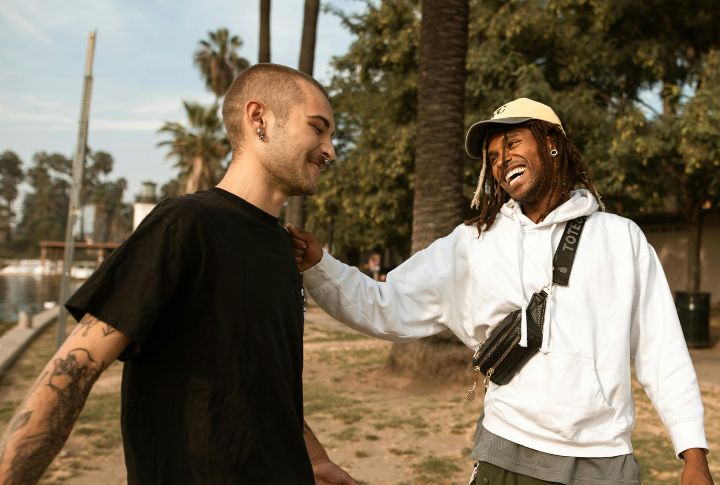
People rarely say exactly what they mean. Instead, they lean on everyday phrases that sound harmless but actually hide emotions they don’t want to reveal. These throwaway lines keep conversations light while leaving the real story unsaid. Chances are, you’ve used a few of these yourself without even thinking about it. Ready to figure out what’s really going on behind all that politeness? It’s time to decode.
“I’m Fine”

Someone says, “I’m fine,” but you know better. It’s the universal way to cover stress or sadness and avoid conversation. Across cultures, the phrase now translates as “I’m not okay.” Listen closely, the voice always betrays it. And when that forced smile follows, the gap between words and truth becomes impossible to miss.
“I’m Just Tired”

You’ve probably heard it—or even said it yourself: “I’m just tired.” It slips out so easily, like a shield. Sure, it sounds simple; however, half the time it’s not about needing a nap. It’s about stress, fear, or emotions you’d rather not explain. Because it sounds so normal, nobody pushes back.
“It’s No Big Deal”

People use “It’s no big deal” when they want to brush aside hurt feelings. This is a common mask for disappointment, especially after someone feels excluded. Yet the phrase rarely convinces anyone. Also, listeners usually sense the truth lingers beneath. Depending on the tone, it can even come across as sarcastic instead.
“I Don’t Care”

When someone says, “I don’t care,” don’t take it literally. It’s usually a shield against disappointment and not proof of indifference. Teens usually throw it out when embarrassed, adding eye rolls or folded arms for emphasis. Funny enough, the louder and more often it’s repeated, the clearer it becomes that they do care.
“It Doesn’t Matter”

“It doesn’t matter” is rarely honest. It’s a way to signal something matters without discussing it. People use it to end conversations quickly, frequently when emotions are running high. Silence usually comes next, and frustration lingers. That’s why the phrase is commonly labeled one of the most passive-aggressive replies.
“I’m Over It”

After heartbreak, you’ll hear it a lot: “I’m over it.” Sounds convincing, right? But usually, it’s a cover. It protects from awkward sympathy and helps people pretend they’re fine. Post it on social media, and suddenly it’s performance—control projected outward, even if emotions are still swirling inside.
“I’m Busy”

“I’m busy” is the classic excuse everyone knows. It’s usually less about packed schedules and more about avoiding difficult conversations. Sometimes this is a polite way to create emotional distance. You’ll see it pop up constantly in text messages, especially when someone doesn’t want confrontation. Busy rarely means every minute is full.
“I Don’t Need Help”

Refusing help isn’t always about independence—it’s about protecting pride. “I don’t need help” is the shield people use to avoid showing weakness. Overachievers are particularly guilty of this habit. The cost can be burnout, stress, or exhaustion. Ironically, those same people often look back and wish they had accepted support.
“Nothing’s Wrong”

People say it all the time, usually when something definitely is. It’s a denial phrase meant to stop further probing. The body language gives it away—crossed arms, heavy silence. Friends rarely buy it, often hearing, “Everything’s wrong.” Instead of reassurance, it usually sparks more suspicion than comfort.
“I Don’t Want To Talk About It”

Avoiding vulnerability is the real purpose of “I don’t want to talk about it.” The words form a hard barrier against sharing true feelings. People lean on it to keep emotions hidden. However, bottled-up emotions rarely stay quiet. Later, they frequently explode, turning one short phrase into a longer mess.
“I Just Need Some Space”

The words “I just need some space” don’t always mean distance forever. They’re usually spoken from emotional overwhelm, as a way to step away without fully explaining. Listeners sometimes take it as rejection. In reality, it may just signal a need to sort feelings. Additionally, the exact space needed is almost never defined.
“I’m Not Mad”

When people say, “I’m not mad,” they often are. The phrase works like armor, blocking off questions or arguments. But body language never lies—tension in posture, clipped tone, restless gestures. Ironically, the harder someone denies frustration, the more obvious it becomes to anyone watching.
“I Just Want Everyone To Be Happy”

“I just want everyone to be happy.” Sounds nice, right? However, it’s usually conflict avoidance in disguise. Instead of stating needs directly, the speaker prioritizes peace. It projects a peacemaker image. Still, there’s a tradeoff. They usually feel unseen. And this phrase pops up most in group tension.
“I Don’t Know”

Here’s the thing about “I don’t know”—most of the time, people do. The phrase serves as a shield that keeps inner thoughts and fears hidden. It’s safer than risking judgment. You’ll even hear it more in personal conversations than professional ones. Once spoken, it tends to freeze the flow of conversation.
“I’m Just Joking”

On the surface, “I’m just joking” softens words. In practice, it hides real emotions behind humor. People use it right after a jab or criticism, and hope it lands more gently. What actually happens? The tension rises. Often the phrase masks frustration, or even envy, while pretending everything was meant playfully.
“I’ll Get Over It”

Easy words, heavy meaning. They’re used to dismiss lingering pain, even when the feelings still cut deep. Typically, it follows heartbreak or rejection. Sometimes it’s muttered to no one at all. And the truth is that healing usually takes far longer than those quick words suggest.
“Don’t Worry About Me”

Used to dodge concern, “Don’t worry about me” hides what someone doesn’t want to admit. It’s a way to cover vulnerability and keep the focus off themselves. Caretakers and strong friends rely on it. The irony? Delivered with a too-bright tone, it often makes others worry even harder.
“I Don’t Want To Be A Burden”

Have you ever heard someone say, “I don’t want to be a burden,” and wondered what’s really going on? Most of the time, it’s about rejection. Ironically, the person saying it often needs support the most. Behind the words, you can sense quiet sadness and isolation.
“I’m Grateful, Really”

“I’m grateful, really” isn’t always what it seems. Frequently, it’s used to cover up disappointment while maintaining the appearance of positivity. In polite settings like work, it shows up a lot. Also, lack of enthusiasm usually gives it away. The word “really” tends to get overemphasized, making the truth even clearer.
“I’m Just Being Honest”

“I’m just being honest.” Four words that usually signal trouble. They’re used to defend blunt remarks that cut deeper than needed. What’s underneath? Resentment, most of the time. The phrase rarely delivers kindness. Instead, it creates tension and almost guarantees an eye roll from listeners who know exactly what’s coming.

